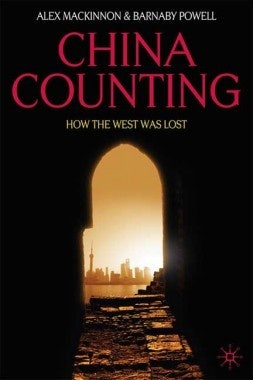China Counting: How The West Was Lost (Palgrave Macmillan, December 2009, $45 Hardcover) By Alex Mackinnon & Barnaby Powell#

We are not advocating appeasement or claiming 'peace in our time' but we are pointing out that knowing China and the Chinese is the first step in a new Long March, away from economies underwritten by political lobbying, from poverty reinforced by financial chicanery, from greed tempered only by fear. In short, we argue that the West has lost the plot and it is China that really counts if we wish for an improvement in our global society. We are urging the ostrich in all of us to lift our heads from the sand and look around at what is coming our way.
China Counting: How the West Was Lost#
, the second book on China written by AlexMackinnon and Barnaby Powell (China Calling: A Foot in the Global Door), addresses one of the greatest phenomena of the last thirty years, and indeed a phenomena that many writers have posited will reshape and ultimately define the century: the rise of a resurgent China and the gradual decline of the West. In the wake of the global economic crisis of 2008-2009, the effects of which continue to hamper the global economic recovery, China's economic growth has powered ahead at a comparatively breakneck pace.
When viewed in contrast to the leaden strides other major economies have made toward recovery, the rosy news coming out of a number of Chinese industries -- from automobiles to infrastructure to construction -- give some observers cause for celebration and others cause for concern. According to Mackinnon and Powell, however, no matter what happens in the short term, a resurgent China and a declining West will ultimately have no choice in the years ahead but to come to terms with one another, with the West -- in their eyes -- ultimately in for a rough adjustment. Rather than viewing this adjustment as a zero-sum game, however, Mackinnon and Powell take a contrarian view that aims to dispell misunderstandings about what exactly a global rebalancing can and will mean for all of us.
Throughout the book, Mackinnon and Powell insightfully illustrate how Chinese history and culture, and the country's evolving sense of self and its place in the world have affected, and will continue to affect, its future trajectory. With the growth in influence of China and its culture, and the declining centrality of Western culture, Powell and Mackinnon see a more assertive -- but not necessarily hostile -- China emerging in coming years. To help break down what this means for the rest of the world, Mackinnon and Powell look at a wide range of potential outcomes, discussing everything from China's rising regional hegemony to the end results of the country's massive investment in natural resources far beyond its borders.
Though a thorough breakdown of China Counting is beyond the scope of this particular review, it is important to point out that while this book is certainly not to everyone's taste -- it is, at times, a very bitter pill to swallow, and in Jing Daily's opinion tends to gloss over or downplay some of the important issues (pollution, coastal/inland divide, potential overcapacity, aging population, male/female gender disparity, rising India, Southeast Asia backlash) that China is very likely to butt up against in coming years -- it is clear that Mackinnon and Powell are very familiar with much of the subject matter. Unlike other recent books by authors with little (or no) practical China experience, the authors of China Counting have worked in or dealt with China in some way or another for decades.
For anyone who is interested in how to possibly reconcile their existing worldview with a rising China without much of the hyperbole that other recent books like When China Rules The World by Martin Jacques (or, on the flip side, The Coming China Wars) rely on to move copies, China Counting could prove a useful roadmap for navigating the gradual global rebalancing that we will all experience in our lifetimes. Luckily, Mackinnon and Powell prove to be seasoned and helpful tour guides, explaining that a rising China does not necessarily equate to a collision course. Rather, it just means that "a nation with a millenia of experience in running itself [and 1/5 of the global population]...is rightfully counting down to a seat at the round table of global rule."
China Counting: How the West Was Lost by Alex Mackinnon and Barnaby Powell is available for purchase on the Palgrave Macmillan website or on Amazon.com.